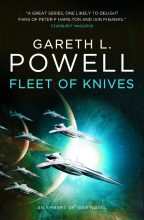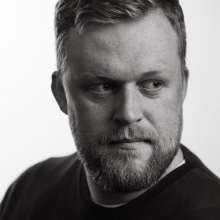Fleet of Knives by Gareth L. Powell
What led you into writing?
I’ve always wanted to be a writer, since I first learned to read at the age of four. I’ve always played with ideas in my head and wanted to tell my own stories. I studied creative writing at University, but didn’t start writing seriously until the turn of the Millennium, when I decided it was time to walk the walk as well as talk the talk.
How does a typical day look?
I get up around 6:30 am and get the kids ready for school. Then, after dropping the off at school, I will read a book in the bath for half an hour to get my brain into fiction mode. Then I’ll fuel up with tea and try to write as much as I can before it’s time to go and pick the kids up again at the end of the day. Usually, I’m satisfied if I can get a thousand words written.
In what ways do your characters test your abilities?
Every character is different, and so it takes a lot of thought to put myself into their skin and write from their point of view. It’s a bit like method acting, I suppose. But instead of portraying the character on stage, my performance is through the written word.
What’s your setup?
I have an Apple desktop with two linked screens, so I can look at several documents at once. My office is built onto the back of the house and used to be a granny flat. Now it holds bookshelves, a couch, and my desk. It’s very untidy.
What lasting effects have your favourite authors had on your writing and style?
Reading Iain M Banks taught me that it’s okay to let your imagination off the leash and dream big.
What do you do for inspiration?
Inspiration has never really been a problem. I have a million ideas. The difficult part is deciding which of those ideas are the right ones for me. Which ones excite me enough that I’ll spend six or eight months working on them?
What repeating themes do you find yourself pulling into your stories?
My work seems to feature a lot of characters who are trying to live with traumas and guilt from their past. They’ve lost loved ones. Sometimes even themselves. And it’s how they repair themselves and forge a new path, and often accrete a new found family around themselves, that seems to inform a lot of my stories.
How do you wind down?
I really don’t.
What sort of challenges do you regularly overcome while world-building?
Usually the biggest challenge is keeping it all straight in my head. Often I have to scroll back through to earlier chapters to remind myself of the names I’ve given to planets or alien races. I know I should make notes as I write, but I’m a bit lazy. I never have a series “bible” with all the background painstakingly detailed — I just make it up as I go along.
What’s the most useful advice you could give to an aspiring author?
Read a lot. Read books you love, and figure out why you love them. How does the writer make you love them. What specific things do they do to achieve that effect? Then read some books you hate. Bad books. And repeat the process. What specifically is it that makes you hate this book. Try to isolate the reason, so you can avoid it in your own writing.
Anything you’d like to promote?
My literary space opera, FLEET OF KNIVES is out now from Titan Books. Tor.com Publishing will be releasing my horror novella RAGGED ALICE in April.
👋 Hi! I run Author Interviews
As a new writer I found myself itching to contribute to a thriving, creative community, so I made Author Interviews and I've met loads of wonderful people in the process. You can buy my debut fantasy RINGLANDER: THE PATH AND THE WAY from Amazon.


 Audible
Audible


